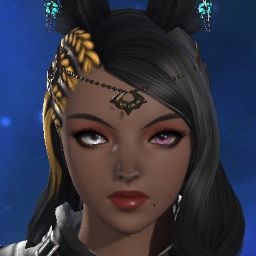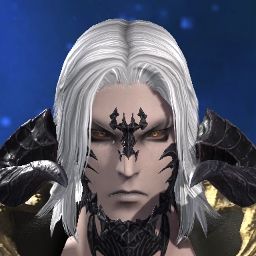I'm rather confused why there's accusations of moving goal posts when it really just seems like massive miscommunication/misunderstanding. It really seems like 2 people having 2 completely different conversations at each other with some of this back and forth.
-
10-15-2023 01:43 PM #8821Player

- Join Date
- Aug 2021
- Posts
- 857
- Character
- Xirean Summit
- World
- Goblin
- Main Class
- Dark Knight Lv 100
(3)
-
10-15-2023 02:21 PM #8822Player

- Join Date
- Aug 2021
- Posts
- 857
- Character
- Xirean Summit
- World
- Goblin
- Main Class
- Dark Knight Lv 100
Random topic change but I want people's thoughts. Is the fight against Zeromus a better fight then against Zodiark?
(2)
-
10-15-2023 02:42 PM #8823
If you mean gameplay wise, not really, as none of Zeromus' mechanics are particularly unique/difficult and it's mostly just a lot of unavoidable damage to heal through.
If you mean story wise, the thing basically just exists long enough for Golbez to pull his heel face turn and Zero to have her big heroic moment to close off the story arc...so I'd also lump it in as "not really". Zodiark was at least the beginning of a bigger problem, but Zeromus accomplished literally nothing before it got axed.(8)
-
10-15-2023 02:45 PM #8824Player

- Join Date
- Feb 2019
- Location
- I like Viera?
- Posts
- 324
- Character
- Kasumi Bunja
- World
- Shiva
- Main Class
- Astrologian Lv 100
Whats the diffrence ?
There is not much, both fight had the same arena, the boss model works the same and looks similar, mechanics are similar to each other, with some fluff here there but overall its the same fight again.
With the same result " we did not really win, somebody else did". Its story telling Wow style and as you can read, not my favorit way of story telling. I liked the Voice of Zodiark more, the voice and the way of screaming and yelling at you. While Zeromus was... more like whine and wail (maybe lament but it was not interesting nor pulled it hearthstrings) and annoyed me really fast. The music both times were very good, as the visiuals and animations.
So which one is better? Sorry but both, sure both fight have their pro and cons but both are well put together and even have the same story telling problem... so both. Also the 2 encounter are not hard to learn and easy to farm. So thats a plus with my luck.... Tsukuyomi Extreme - my FC and i collected 29 Aquariums before we got all the mounts and we are static group for EX-Farm. The weapons are both not something i fancy.
-
10-15-2023 02:50 PM #8825
I said past viewing is particular to Venat-- that doesn't mean soley responsible.I said the Echo has a diverse array of applications-- true. I said it varies based on interest and aptitude-- true. That means, possibly, someone else used it to peer into pasts. But my point ultimately is that it is not "casually done". That's the post that inspired the comments and it's incorrect. I never said it was "special amongst the ancients". Again, I said it's particular to Venat and people who follow her. The Ascians in general use the Echo throughout the story in myriad ways, all of which follows what I'm saying. Diverse applications driven by interest and/or aptitude. It's not that complicated. You can use it to prime, you can use it find souls, you can use it to body hop, etc etc.
I'm not sure what you're referring to and whatever it is, you're probably distorting it, so I will need to see the exact quote.
There's no database that says they'd reach or be able to deal with Ultima Thule. It may say they were developing space travel- that's distinct from being able to travel to the end of the universe.
Yes but the idea that it would escape his notice since he's the cause is highly unlikely. He's the specialist of the celestial...it's specifically pointed out as her reasoning, so he can help with a solution. Let's say she does accuse him to other members, is all of Elpis supposed to pretend around him that he isn't the cause? As they're pursuing his creation at the end of the universe? Not only does that sound ridiculous, it sounds like terrible storytelling. You're also trying to paint it like the Ancients were these highly educated, perfectly rational beings and it just doesn't work. They weren't. They still had human personalities behind their occupations and knowledge. The "Venat should've turned the whole Convocation on Hermes" plot is dumber than any of the msq of XIV that we have.
This is meaningless self indulgence. "Well Zodiark is strong so they could've done better". Ok. I guess? They weren't in control of the timetable and neither was Venat really. She is in your hypothetical because you think her insight on Meteion would've somehow impacted or delayed the Final Days. It's so hypothetical it's meaningless to get into.(0)Last edited by Turtledeluxe; 10-15-2023 at 02:51 PM. Reason: formatting / sp
-
10-15-2023 02:52 PM #8826
Obviously you missed the key moments of Endwalker while dissecting an MMORPG for what you would prefer the story to be because yes...the plot concedes that Venat has a bit of a hangup and "cannot return to the star as long as they need help". Part of what makes her final battle so cathartic is that she's free of that obligation she's been feeling. It's not a lack of faith-- she tells you in the fourth wall break conversation (which is an incredible scene) her real reasons for wanting to live and it's not really just because people need help. That's why one of the options is to call back to her by name and one is about finding out how to walk. Because part of her story is Venat the traveler and the other part is her being a savior figure for humanity. You're all also calling out her choices as though she doesn't even talk about them or her reasoning. Play the trial again or something, idk. She knows what the sundering has wrought and she's not exactly thrilled, she wasn't even that optimistic about the odds and was keeping the Ascians basically at bay throughout the expansions. She also admits to failure "time and time again". Would it be nice if she didn't have to resort to sundering...possibly? That's not the story of the game.
You saying she could've done better or could've done things differently is just your opinion, and that's fine. It just doesn't make the story better-- in fact it makes it worse. I think again, you're self indulging because you are egotistically dismissing what happened as "genocide" and you could've done (as in written) so much better. OK
In fact I would go even farther and say, Venat appealing to the Convocation is dumb and robs the entire story of the major theme of growth. Yes, the sundering sucks and rendered humanity into imperfect and trivial beings. But it also taught them to contend with the Final Days and defeat the threat-- a problem caused by the Ancients. You seem to wish it somehow ended up that they solved their own problem-- that just sounds boring and unsurprising.
I think they're the same to be honest. Trials are generally gauged in difficulty by how they feel day one. People learn the fight and then it seems easy. So people will be biased and tell you Zeromus is better because by now, Zodiark feels more stale and predictable.(0)Last edited by Turtledeluxe; 10-15-2023 at 03:03 PM.
-
10-15-2023 02:57 PM #8827
-
10-15-2023 03:09 PM #8828Player

- Join Date
- Sep 2013
- Posts
- 10,051
- Character
- Matthieu Desrosiers
- World
- Cerberus
- Main Class
- Reaper Lv 90
If the supposed themes of a story only work by having the alleged and self proclaimed 'heroes' bending over backwards to justify a horrific act of genocide as a necessity then perhaps the themes aren't all that great or heroic to begin with. Furthermore, numerous examples have been posted throughout this very thread showing precisely how the established themes and morals of the game do not actually hold up as consistent under even surface level scrutiny.
(17)
-
10-15-2023 03:53 PM #8829Player

- Join Date
- Jul 2015
- Posts
- 1,259
- Character
- Ashe Sinclair
- World
- Phoenix
- Main Class
- Thaumaturge Lv 60
So I'm going try and explain this the best way I can, because it is a very hefty accusation to make, as is a lot of the criticism levied at Venat, and I want to offer some insight since I think the actual point behind it sometimes gets lost amidst the emotion the subject conjures up. I'm not a fan personally of invoking certain buzz words to describe what went on in the story for that reason.
One thing you are right on, though, is your confusion as to why the Scions or the WoL would ever be the ones to call out Venat. That could never happen, because we are the ones who actually act as the catalyst to her actions for our own benefit - but the idea that she never actually comes up against anyone who points out the double standard in her actions, even the people who stood against everything she did and worked against her, is still an issue.
But yeah, this is a thesis and I sincerely apologise for that, lol, but I wanted to try explaining this as simply as I could. It's not so much a response purely for this reply as it is for the topic in general, or anyone interested:
Why Venat Kind of Sucks, or, Why Everybody Sucks Equally:
So starting from the beginning, in ShB we hear from Emet that they summoned Zodiark to stop the Final Days, he/ it succeeded, and that there were some people who feared his power who eventually summoned Hydaelyn in response to keep him in check. They fought, Hydaelyn struck a single blow that wound up causing the Sundering - though it remains ambiguous as to how intentional it was - and later on we learn from phantom Hythlodaeus about the sacrifice required to bring Zodiark into being, how they wanted to offer up the new life in return for the lives lost in the sacrifice, and that the faction who brought Hydaelyn into being disagreed with this and it served as the motivation for her summoning.
At this stage, it's acknowledged that what happened to the Ascians and their people was tragic even in light of this disagreement and we sympathise with Emet's pain, but ultimately we can't condone his actions and allow the Ascians to continue, because murder is wrong, we also deserve to live, and it's not up to him to decide who will live and who will die. It's also inferred there was more going on behind the scenes that Emet remains wilfully ignorant of relating to the power/ influence Zodiark exerted and the fact of their tempering, and that there was a reason the situation was untenable and made the summoning of Hydaelyn a necessity, and the Sundering an unfortunate but feasibly unintended outcome. Cool.
Enter EW. We lose the angle of the Convocation and/ or Zodiark being the pivotal problem as well as the issue of the sacrifices, and it becomes purely a matter of their suitability in weathering the Final Days. We learn that Venat knew everything all along, and what we told her guided her actions and triggered the events ShB first revealed. And this is where it falls apart.
First of all, any sort of moral high ground Venat may have had over the Ascians that justified her position is now gone, because the minute she knew what the consequences of her actions entailed, what followed was no longer about concern for the preservation of life. She loses that argument after she consciously chose to sacrifice everything along with the Ancients in the Sundering to allow for the future where we exist. The new life wound up dead along with all the rest of them.
In an attempt to maintain it, the argument becomes "well, they couldn't handle despair, so they wouldn't have been able to defeat Meteion, and they needed to die to make way for the humans that could." But the problem here is that the mortals succeeding is not actually a given outcome - she even comes up with a contingency plan in the event we fail - nor is it a particularly fair comparison, when we have the benefit of prior knowledge and insight into the phenomenon because of what they went through. This is just a judgement Venat makes herself. She is given the information about what will come to pass, including the murders perpetuated by the Ascians as a result of the Sundering as well as the tragedy of the Sundering itself, she is crucially told what the Ancients never had access to in having knowledge of the true cause behind the Final Days and how to combat it, and she is left with a choice: to either believe in her own people, offer them vital information and see if she can prevent any of these events coming to pass, or going through with it and believing in us instead. And she chooses the latter. She chooses to throw her chips in with our lot, believing we are the best hope for mankind, which is meant to be very heartening and moving, but obscures the fact that in so doing not only is she making a choice here of who gets to live (and try) and who dies, and depriving the Ancients of the agency to self-determine their fate, (regardless of the outcome) - which was the very reason we fought Emet in ShB in the first place - and of the knowledge that might help spare them further, but she decides that everything the Ascians did, including the deaths of the victims of their actions, is necessary to make that happen. When the idea that "X needs to die to make future Y come to pass" is exactly the same judgement the Ascians made that they are so frequently condemned them for, only the difference here is that it is framed positively, in that she has been inspired by the WoL and chosen to place her faith in us. But that doesn't change the fact that the crux of it is that she has judged us more worthy of life in this instance, and we allow it because it preserves our future. And through this decision, the sum of her sacrifices actually winds up greater than theirs, because of the accumulative collateral damage needed to get to that future in the first place in terms of the Ancients, the new life, the seven shards and all of their inhabitants, and the victims of the Calamities. She knew all of this was the price to pay for the judgement she made, and she said "okay."
So basically the Ascians killed the Sundered, and said "we choose our people. You are not good enough to be entrusted with the fate of this star." And we criticised them for that, and we fought them believing in every living being's right to life and the ability to decide their own future.
Venat killed the Ancients, the supposedly all-important new life, allowed these other murders to go on unchecked because she needed them to happen, and said, "I choose these people. You are not good enough to be entrusted with the fate of this star." But for some reason this is seen as right, and her character viewed as wise, benevolent and kind. And this is what people are arguing against; neither side is right here, but fighting for their own corner, with Venat's decision actually having the edge on whose choices resulted in the greater number of sacrifices. To which other people say, well, Venat being seen positively is what the writers clearly intended, so it must be right, and the judgements and perceptions of the characters are correct because the writing said so, and you wind up with two different points of view duking it out on the forums for two years, when really it all comes down to a case of bad writing as a result of rewriting and cutting large chunks of an entire story at the last minute and trying to be deep and philosophical without sufficiently exploring the themes involved or providing adequate set-up to allow that to happen and feel genuine and meaningful - but not everyone wants to see or consider that, and this is where the duking it out gets personal and very heated. Whereas if this had simply stayed an issue between the two sides with no interference on our part, it all would have remained an unfortunate tragedy of clashing ideals, with Venat and her belief in the value of life giving her the moral victory over the Convocation, and leading to the natural outcome of her assuming stewardship over the newly-Sundered life after the fact and doing her best to nurture and protect them against the Ascians, which keeps her framed in a consistent, positive light and renders the rejoinings and such a sad fact of reality that she tried to prevent. Or, to put it more simply, a coherent story. Which is all most people here actually wanted, really. But apparently that just wasn't "good enough."(14)Last edited by Lunaxia; 10-15-2023 at 03:58 PM.
-
10-15-2023 11:54 PM #8830Player

- Join Date
- Apr 2022
- Posts
- 1,181
- Character
- Wind-up Everyone
- World
- Zodiark
- Main Class
- Arcanist Lv 52
This is a bit of a tangent, but did showing allag at its degenerate height (echo vision around tower of zot, 5.4 patch content in azys lla) indirectly elevate further the utopian angle of elpis/the presundered world?
(0)



 Reply With Quote
Reply With Quote












